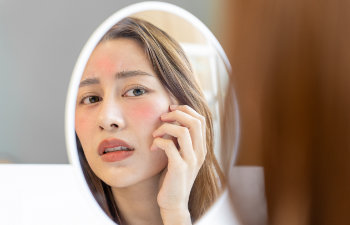
Ringworm, also known as tinea, is a common fungal infection that affects the skin, nails, or scalp. Despite its name, it has nothing to do with actual worms. The infection is caused by a type of fungi called dermatophytes, which thrive in warm, moist environments. Recognizing the symptoms early is essential for effective treatment and to prevent the infection from spreading to others. At Medical Dermatology Specialists in Atlanta, GA, we treat various skin conditions, including ringworm, helping you understand the signs, causes, and steps to take if you suspect you have this infection.
Common Symptoms of Ringworm
Ringworm can present differently depending on where the infection occurs on the body, but there are some key symptoms to watch out for:
- Red, Circular Rash: One of the most distinctive symptoms of ringworm is a red, circular, or ring-shaped rash. The edges of the rash are usually raised, while the center may appear clearer or scaly. The rash often causes itching and discomfort.
- Itchy, Scaly Patches: In addition to the ring-shaped rash, you might experience patches of skin that are dry, scaly, and itchy. This is especially common in cases of tinea corporis (body ringworm) and tinea pedis (athlete’s foot).
- Blisters or Pustules: In some cases, particularly with athlete’s foot, small blisters or pustules may develop on the skin, contributing to discomfort and irritation.
- Hair Loss: When ringworm affects the scalp (tinea capitis), it can lead to bald patches. These areas may be red, itchy, and scaly, and the hair in the affected spots can become brittle and break easily.
- Thickened or Discolored Nails: If the fungi infect the nails, known as tinea unguium or onychomycosis, the nails may become thick, brittle, discolored and may even separate from the nail bed.
Causes of Ringworm
Ringworm is caused by direct contact with the dermatophyte fungi, which can be found on various surfaces. Common sources of infection include:
- Person-to-Person Contact: Ringworm is highly contagious and can spread through direct skin contact with an infected person.
- Animal-to-Human Transmission: Pets, especially cats and dogs, can carry ringworm. Farmers and individuals who work with livestock are also at risk of contracting ringworm from infected animals.
- Surface Contact: The fungi can live on surfaces like towels, bedding, clothing, and gym equipment. Walking barefoot in locker rooms or public showers increases the likelihood of contracting athlete’s foot, a type of ringworm.
- Warm and Humid Environments: Dermatophytes thrive in warm, damp environments, making sweaty clothes, damp towels, or humid climates ideal for their growth.
According to the CDC, approximately 20-25% of the global population is affected by fungal skin infections like ringworm at any given time. Athlete’s foot, a type of ringworm that affects the feet, is one of the most common fungal infections worldwide, affecting 15-20% of people during their lifetime. In the U.S., ringworm is particularly common in children, especially those involved in sports or who interact frequently with pets.
When to Seek Medical Attention
While over-the-counter antifungal treatments can help mild cases of ringworm, it’s essential to consult a dermatologist if:
- The rash spreads or worsens.
- You experience severe itching or discomfort.
- The infection affects your scalp or nails, as these forms of ringworm may require prescription-strength medication.
- The infection persists despite treatment.
At Medical Dermatology Specialists in Atlanta, GA, our team of experts can diagnose ringworm through physical examination and, if necessary, take a skin sample for laboratory testing. We’ll prescribe an effective treatment plan tailored to your specific needs, whether through topical antifungals or oral medications for more severe cases.
Preventing the Spread of Ringworm
Preventing ringworm involves maintaining good hygiene practices, such as keeping your skin clean and dry, washing your hands regularly, and avoiding sharing personal items like towels or clothing. If you have a pet, regularly check them for signs of ringworm and keep their living areas clean.
Ringworm is a common but manageable skin infection. If you suspect you have ringworm or notice symptoms in a loved one, reach out to Medical Dermatology Specialists in Atlanta, GA, for expert care and treatment. We can schedule an appointment with one of our dermatologists for a ringworm examination and provide medical advice and treatment to relieve your skin infection.
Posted on behalf of
5730 Glenridge Drive, Suite T-100
Atlanta, GA 30328
Phone: Call (404) 939-9220
FAX: (470) 312-2157
Email: jstalls@atlmedderm.com


